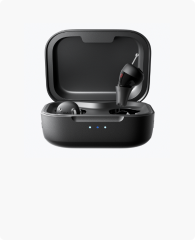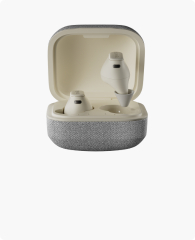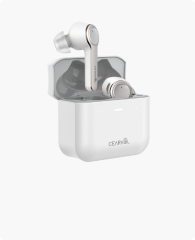Tinnitus, often described as a persistent ringing, buzzing, or hissing in the ears, impacts millions of individuals worldwide. It ranges from a mild nuisance to a debilitating condition, significantly affecting daily life. While there's no definitive cure for tinnitus, hearing aids have proven to be a game-changer for managing its symptoms. In this guide, we'll explore how hearing aids help, what features to look for, and additional tips to improve your quality of life.
🚀 Navigate This Post
- ➤ Part 1: What Exactly Is Tinnitus?
- ➤ Part 2: How Do Hearing Aids Help Tinnitus?
- ➤ Part 3: Different Types of Hearing Aids for Tinnitus
- ➤ Part 4: Are Hearing Aids the Only Solution for Tinnitus?
- ➤ Part 5: Choosing the Best Hearing Aids for Tinnitus
- ➤ Part 6: FAQs About Hearing Aids and Tinnitus
- ➤ Part 7: Real-Life Tips for Managing Tinnitus
- ➤ Conclusion
You may also be interested in:
- Tinnitus and Hearing Loss: What's the Connection?
- Hearing Issues: Sensorineural Hearing Loss
- Hearing Issues: Conductive Hearing Loss
Part 1: What Exactly Is Tinnitus?
Tinnitus isn't a disease but rather a symptom of an underlying issue. Understanding its causes is key to finding relief. Common causes include:
1. Age-related hearing loss (Presbycusis): Often, the natural decline in hearing with age is accompanied by tinnitus.
2. Noise-induced hearing loss: Exposure to loud sounds over time can permanently damage the tiny hair cells in your inner ear.
3. Stress or anxiety: High stress levels can trigger or exacerbate tinnitus symptoms.
4. Ear infections or blockages: Wax buildup, ear infections, or fluid in the middle ear may cause temporary tinnitus.
5. Medication side effects: Certain drugs, such as aspirin or chemotherapy medications, are known to worsen tinnitus.
Fun fact: Over 90% of people with tinnitus also experience some degree of hearing loss. This connection explains why hearing aids are so effective.

Part 2: How Do Hearing Aids Help Tinnitus?
Hearing aids offer significant relief for tinnitus sufferers by addressing several underlying issues:
1. Amplifying External Sounds
Tinnitus tends to be more noticeable in quiet environments. By amplifying everyday sounds, hearing aids create a masking effect, making the internal ringing less dominant.
Example: Imagine sitting in a quiet room with a dripping faucet. Now, add soft background music—suddenly, the dripping fades into the background. Hearing aids work similarly for tinnitus.
2. Providing Tinnitus Masking Features
Many modern hearing aids include built-in tinnitus therapy. These programs emit soothing sounds like white noise, pink noise, or ocean waves to distract your brain from the ringing.
3. Rewiring the Brain
Hearing aids help retrain the brain by restoring auditory input. When your ears can hear clearly, the brain stops overcompensating, reducing the "phantom" sounds of tinnitus.
4. Reducing Stress and Fatigue
Tinnitus often leads to mental exhaustion, as your brain struggles to focus through the noise. Hearing aids lower this cognitive load, improving concentration and mental well-being.
For more insights, explore our article on How Do Hearing Aids Work.

Part 3: Different Types of Hearing Aids for Tinnitus
If you're considering hearing aids for tinnitus relief, it's important to know the options available. Here's a breakdown of common types:
1. Behind-the-Ear (BTE)
- Best for: Moderate to severe hearing loss.
- Advantages: Larger size allows advanced features like tinnitus programs and longer battery life.
2. In-the-Ear (ITE)
- Best for: Mild to moderate hearing loss.
- Advantages: Smaller and more discreet than BTE models, yet still capable of tinnitus management.
3. Completely-in-Canal (CIC)
- Best for: Mild hearing loss.
- Advantages: Nearly invisible, though less feature-packed compared to larger models.
Note: Some over-the-counter (OTC) hearing aids now offer tinnitus therapy features, making relief more accessible and affordable than ever.
For more in-depth information on hearing aids, visit everything about hearing aids.
Part 4: Are Hearing Aids the Only Solution for Tinnitus?
Hearing aids are incredibly effective, but combining them with other treatments can enhance results:
1. Cognitive Behavioral Therapy (CBT)
CBT addresses the emotional distress caused by tinnitus. It helps you develop coping strategies and shift focus away from the ringing.
2. White Noise Machines
Standalone white noise machines or apps can provide continuous sound therapy, particularly useful at night.
3. Relaxation Techniques
Stress exacerbates tinnitus symptoms, so practicing meditation, yoga, or breathing exercises can offer significant relief.
4. Diet and Lifestyle Changes
- Limit caffeine, alcohol, and salt, as these may worsen tinnitus.
- Regular exercise improves blood flow, which can benefit auditory health.
Part 5: Choosing the Best Hearing Aids for Tinnitus
Not all hearing aids are equal when it comes to tinnitus management. Here's what to look for:
1. Tinnitus Masking Programs
Ensure the device offers customizable sound therapy options like white or pink noise.
2. Noise Reduction and Directionality
Advanced noise reduction improves clarity in noisy environments, while directional microphones focus on the speaker in front of you.
3. App Connectivity
Most modern hearing aids allow users to control volume, sound profiles, and tinnitus masking features through smartphone apps—adding convenience and personalization.
4. Durability
Tinnitus sufferers often wear hearing aids for extended periods, so comfort, sweat resistance, and long battery life are essential.
If you're looking for a good starting point, consider looking into Cearvol hearing aids. They come with various features designed to alleviate the symptoms of tinnitus and improve hearing overall. You can check out Cearvol hearing aids for more details.

Diamond X1 - Best Hearing Aids with Bluetooth
Newcomer Price
$249.99 $309.99
- ✔ Adaptive sound modes for clear hearing.
- ✔ Bluetooth for calls & streaming.
- ✔ App-controlled, customizable adjustments.
- ✔ Rechargeable & fast charging.
- ✔ Ideal for mild to moderate hearing loss.
Part 6: FAQs About Hearing Aids and Tinnitus
1. Can hearing aids make tinnitus worse?
Properly fitted hearing aids will not worsen tinnitus. However, poorly calibrated devices or excessive volume may temporarily aggravate symptoms.
2. How long does it take for hearing aids to help tinnitus?
Many users notice relief within a few weeks, but full benefits may take several months as your brain adapts to the new auditory input.
3. Are there specific brands known for tinnitus relief?
While several brands specialize in tinnitus management, focus on features rather than branding. Look for models with tinnitus therapy programs and a good return policy.
Part 7: Real-Life Tips for Managing Tinnitus
Living with tinnitus can be challenging, but small changes make a big difference:
1. Create a Sound-Rich Environment
Don't let silence amplify the ringing. Keep soft music or ambient noise in the background.
2. Establish a Bedtime Routine
Tinnitus is often worse at night. Try mindfulness meditation, soothing sounds, or a white noise machine before bed.

3. Stay Socially Active
Engaging in conversations and hobbies helps distract your brain from tinnitus.
4. Monitor Your Hearing Health
Regular checkups with an audiologist ensure your hearing aids are optimized for both hearing loss and tinnitus relief.
Conclusion
Hearing aids provide a beacon of hope for those suffering from tinnitus. While they don't cure the condition, their ability to amplify sounds, offer sound therapy, and reduce cognitive strain makes them an invaluable tool for relief. Combined with lifestyle adjustments and professional guidance, hearing aids can help restore peace to your everyday life.
If you're struggling with tinnitus, consult an audiologist to determine the best hearing aid solution for your needs. Relief is just a step away—don't wait to reclaim the sounds you love.








Leave a comment
All comments are moderated before being published.
This site is protected by hCaptcha and the hCaptcha Privacy Policy and Terms of Service apply.